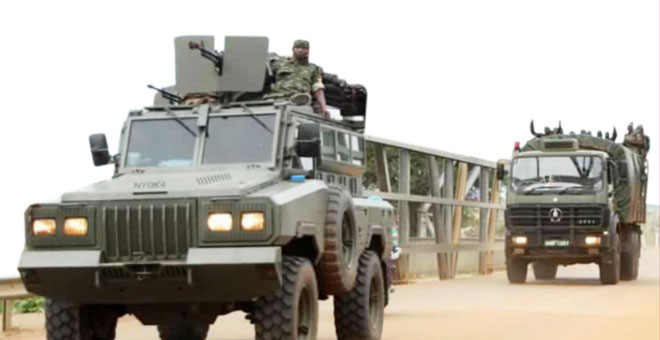
A partnership between the UPDF and one of China’s largest defence contractors could upset allies America
Kampala, Uganda | IAN KATUSIIME | On Nov. 30, the Ugandan army alongside the Democratic Republic of Congo (DRC) Forces (FARDC) launched joint air and artillery strikes against camps of the Congo-based Uganda rebels of the Allied Democratic Forces (ADF).
But as Uganda seeks to sustain its incursion in the DRC, its neighbour to the west, one major international player could indirectly determine how the military confrontation plays out: China.
The Independent has established that globally renowned Chinese military contractors are working with Uganda Peoples Defence Forces (UPDF) and could make a difference in taking the battle to the ADF.
An investigation by The Independent has so far yielded two names of major Chinese contractors that have recently supplied the UPDF; China North Industries Corporation (Norinco) and Poly Technologies Inc.
Norinco is one of the top Chinese arms manufacturers. It is the primary supplier of military equipment for the Chinese army; providing tanks, long-range suppression weapons, and air defence among other battle equipment. The group also supplies weapons and technical support to the Chinese navy, air force, rocket force, strategic support force, and police.
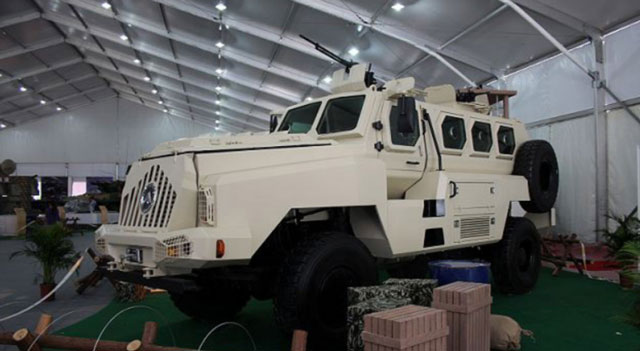
As part of its growing China-made military arsenal, Uganda recently acquired the VN-2C, an Infantry Fighting Vehicle (IFV), from Norinco. On Nov.19, one of the VN-2Cs was displayed at a ceremony where President Yoweri Museveni passed out 543 graduates who had successfully completed the Armoured Crew Course Level 3, at the Armoured Warfare Training School (AWTS) in Karama, Mubende.
Uganda is the first operator of the VN-2C, according to people with knowledge of the latest developments in military warfare. The other African country operating this IFV is Mali.
The other contractor, Poly Technologies Inc., has been working with UPDF for close to a year now having been unveiled in March by Lt. Gen. Muhoozi Kainerugaba, President Museveni’s son and then head of the Special Forces Command (SFC). At the time, Muhoozi met with four officials from Poly Technologies at the SFC headquarters in Entebbe alongside other SFC officers.
The Chinese company is supplying the UPDF with CS/VP3 Armoured Personnel Carriers (APCs) which are in the category of Mine Resistant Ambush Protected (MRAP) vehicles, a months-long investigation by The Independent reveals. The CS/VP3 seems to be a favourite product for armies and police forces.
A source at the Ministry of Defence says a number of the CS/VP3 vehicles were stationed on an island in Kalangala for exhibit purposes as officials of Poly Technologies entered into transactions with the UPDF. It is not clear how many of these APCs the UPDF ordered for.
As Uganda awaits delivery of its batch, it will however not be the first time it is dealing with Poly Technologies. In 2016, Uganda Police received a consignment of 35 of these same APCs just days before the 2016 presidential elections. The company’s operations with Uganda Police date as far back as 2013.
The source said the contract between the UPDF and Poly Technologies was initially meant to cover a seven year period but it was scaled down to three years for reasons yet to be established.
According to Made in China, a site that connects buyers with Chinese suppliers, the CS/VP3 has a road speed of 100km/hr and with a maximum cruising range of 800 km. “The CS/VP3 is based on a V-shaped hull and all-welded steel armour that provides a ballistic protection against firing of small arms,” the site describes the machine’s other features.
It adds that land mine protection is provided against 8kg TNT and 16kg of TNT blast all-round and under each wheel respectively. TNT equivalent is a convention for expressing energy, typically used to describe the energy released in an explosion. The vehicle can be fitted with two turrets at the back and front with 7.62mm or 12.7 mm machine guns. It can accommodate a total of 12 soldiers, including the driver and commander.
Poly Technologies unveiled the CS/VP3 at a defence exhibition in Malaysia in 2012. The trading site says one unit can range from US$100,000-250,000 (approx. Shs360–Shs900 million).
The contractor could also supply high grade arms and other military equipment to the UPDF. Among the main products of Poly Technologies that the UPDF could be shopping for are communication devices, marine equipment and parts, aerospace and aeronautical ground equipment.
Unlike most military contractors that deploy highly skilled operatives with boots on the ground, the specialty of Poly Technologies is in armoured vehicles and other arms. The use of military contractors in modern warfare sprouted during the US-Iraq war in 2003 and since then they have been a mainstay in conflict zones in Africa and the Middle East.
Gen. Muhoozi announced on his Twitter account in March that Poly Technologies was working with UPDF and specifically the SFC on a range of programs. Three months later, the President promoted the First Son Muhoozi to the position of Commander of Land Forces in the UPDF.
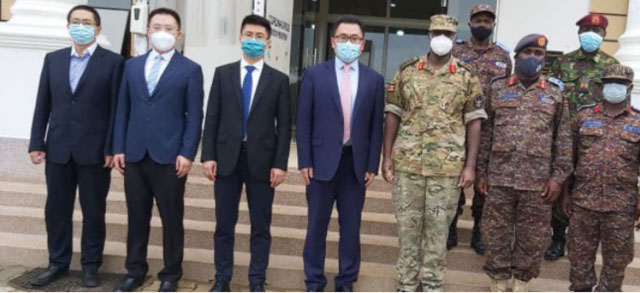
A spokesperson at SFC denied knowledge of Poly Technologies when The Independent made an inquiry at the time Muhoozi was commandeering SFC. However it is widely believed that the transfer of Muhoozi from SFC to one of the highest ranking positions in the UPDF cemented the relationship between the Chinese contractor and the Ugandan army.
Poly Technologies is one of the largest Chinese defence contractors and is a subsidiary of the state -owned China Poly Group Corporation; a business behemoth across various industries in the Asian nation.
The money to pay Poly Technologies will most likely be skimmed from the classified budgets that the Ugandan government consistently allocates under departments like State House and Office of the President.
In October, Shadow Finance Minister Muwanga Kivumbi tabled proposals for the amendment of the law and regulations on classified budgets. Kivumbi raised queries on the annual classified budgets allocated to certain departments including Ministry of Defence while appearing before the Parliament Budget Committee.
It is under these departments that security agencies like International Security Organisation (ISO) and Chieftaincy of Military Intelligence (CMI) are able to finance their clandestine operations.
As the onslaught on the ADF gets into its most critical phases, there is increased scrutiny on the UPDF Land Forces headed by Gen. Muhoozi, which is tasked with routing ADF militants in their nooks and crannies in the North Kivu and Ituri provinces of eastern DRC.
In this position, Muhoozi is in charge of the bulk of the UPDF fighting force and possibly directing how and where Poly-supplied ammunition and weaponry is used. Maj. Gen. Kayanja Muhanga, the Mountain Division commander, is in charge of the operation of hunting the ADF codenamed Shujaa.
UPDF is currently in the thick of the operation with an estimated 1000 troops along with their battle tanks and armoured personnel carriers in DRC territory. The Ugandan troops have established a Forward Operating Base at Mukakati, 18km from the Uganda-DRC border.
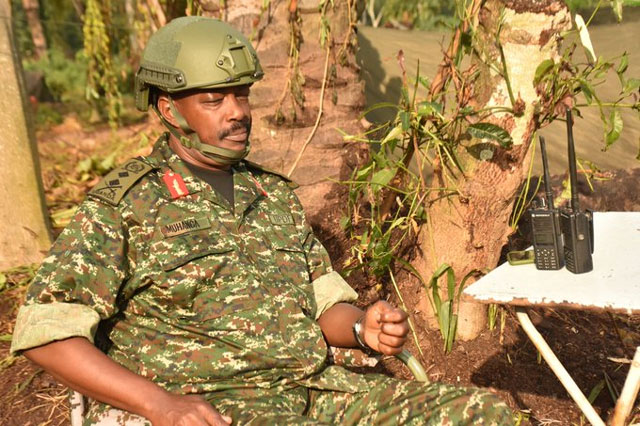
ADF, a rebel group cum terror organisation has lurked in the jungles of the eastern DRC for decades and prior to the UPDF strikes, a large section of Uganda’s security establishment believed that venturing into this stamping ground for the UPDF was the only viable option on the table.
Uganda has accused ADF of committing a plethora of attacks on Ugandans including the recent twin bomb blasts in Kampala that killed six people. The other crimes it is suspected of are assassinations of high profile Ugandans over the years.
US-China rivalry
The highly billed deal between Uganda and the China-based Poly Technologies may rattle some alliances. The U.S., a longstanding ally of Uganda, may not take too well to the arrangement between UPDF and the arms manufacturer if the company’s past transactions are anything to go by.
In 2013, the U.S. levied sanctions on Poly Technologies after it accused the Chinese firm of supplying weaponry to Iran, which the U.S. considers its enemy. The U.S. blacklisted the country under its Iran, North Korea, and Syria Nonproliferation Act.
The U.S. and Uganda are military allies where the latter country has been a beneficiary of U.S. military aid for years under the Museveni government. Since 9/11, Museveni has positioned himself as a counterterrorism go-to-guy for the U.S.
This relationship has been manifest in the hunt for notorious warlord Joseph Kony, leader of the Lord’s Resistance Army (LRA), the global fight against Islamic militants particularly Al Shabaab in Somalia where Uganda maintains over 6,000 troops in the African Union Mission in Somalia (AMISOM).
One notable military aid package stood out: in 2014 when Uganda received U$12.6 million from the U.S. for counterterrorism programs. Uganda is an annual recipient of this aid but this specifically went to the SFC. At the time, then Brig. Muhoozi was the commandant of the SFC.
Therefore, the entry of Poly Technologies, a China state owned military contractor, into Uganda means the East African country could get caught in the cross hairs of a China-US rivalry. The fact that Poly Technologies is working as a major contractor for the UPDF at a time the Ugandan army is in hot pursuit of ADF in the thick forests of DRC completes the geo-political puzzle that the four countries find themselves in.
In DR Congo, the U.S. and China are locked in a power struggle over the control of cobalt. The New York Times reported in November that a Chinese state-backed firm acquired two cobalt mines from an American company; the first one in 2016 and the second in 2020. The Times reported that a Chinese security contractor, Frontier Services Group, is providing security to the mines as well as transport and insurance services.
A US Embassy spokesperson declined to comment on the matter when The Independent made an inquiry about the implications of Uganda paying hundreds of millions of dollars to a Chinese contractor to bolster its defence capabilities while receiving U.S. military aid.
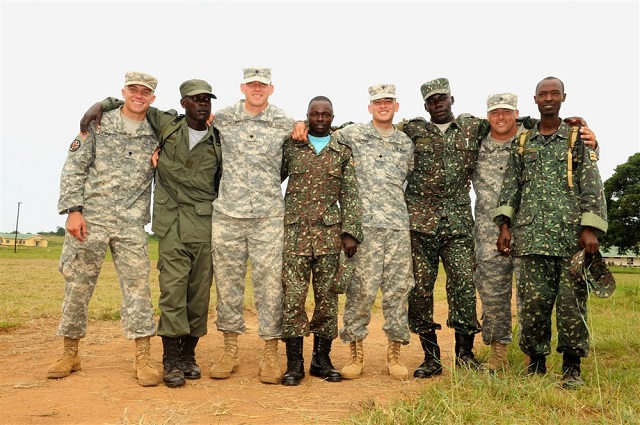
In 2017, defenceWeb reported that the U.S. through its Treasury Department forced the Namibian Defence Forces to cancel a payment of N$156million for defence equipment to Poly Technologies citing the sanctions the US had placed on the company earlier for dealing with Iran.
In the last ten years there has been a proliferation of Chinese security contractors in Africa. These include DeWe Security Service Group, Overseas Security Guardians, Hua Xin Zhong An Group and Frontier Services Group among others. The Frontier Group has operations in Uganda.
Paul Nantulya, a research associate at the Africa Center for Strategic Studies who has written extensively about Chinese security contractors in Africa says they provide a number of benefits to China. “First, they provide a more hands-on approach to protecting China’s overseas interests given that local security forces are not always reliable due to capacity constraints and political complications.”
Nantulya added that the contractors help the Chinese government to resist pressure to deploy the Peoples Liberation Army (PLA) perhaps as routinely as America does its own forces. Thirdly, he said the contractors offer employment to the large population of Chinese veterans who number 57million whom the government has always had a problem dealing with.
Poly client states
The deal between the UPDF and Poly Technologies is top secret just as has been the case with defence spending in Uganda. Also classified are the military contractor’s dealings in many countries.
The Chinese company has a client list of African countries it has done big business with. In 2017, the Kenya National Police Service acquired 35 CS/VP3 vehicles and 25 APCS from Poly Technologies.
The Chinese firm with strong connections to the Peoples Liberation Army (PLA), China’s defence forces is buildings a barracks for Benin’s armed forces as another example of how China has widely spread its influence on the African continent.
It has also dealt with Egypt and Zimbabwe. In 2008, Poly Technologies shipped arms to Zimbabwe as the country was engulfed in protests over a disputed election result. The shipment did not reach its destination after an international backlash that the arms would be used to crush the political opposition.
Outside Africa, the Chinese arms dealer has supplied weaponry to Serbia, Kazakhstan, Iran, North Korea and Syria. As is wont with Chinese businesses, Poly Technologies operates opaquely.
“Unfortunately I have not come across much on Poly technologies. They are a very non-transparent company. I have heard of their involvement in Egypt but there really isn’t much more there either,” Nan Tian, a senior researcher with Stockholm International Peace Research Institute (SIPRI), told The Independent in an email response when asked about the dealings of Poly with African countries.
SIPRI is an institute that researches conflict, arms control and armament where Tian is responsible for monitoring and managing the SIPRI Military Expenditure Database.
****
This story was done with funding from the Africa-China Reporting Project at Wits University
 The Independent Uganda: You get the Truth we Pay the Price
The Independent Uganda: You get the Truth we Pay the Price




GREAT STORY UPDATES.
MYRA HARRIET BALI
Conventional arms for conventional war looks like the wrong tools for what surely must be a search and destroy operation against elusive rag-tag ADF gunmen with a forested area almost the size of Uganda to play in. Search and destroy operations by their very nature are always difficult even for better equipped armies if the US experience in both Afghanstan (recently) and Vietnam score years ago. And in Vietnam the Americans did not find the going any easier even after massive destruction of all forests through defoliation by agent orange sprayed from giant aircraft, and using multitudes of helicopter squadrons to try and find their enemies in the desolate countryside. This may be the beginning of UPDF’s forever war!
It will help fight ADF rebels.
Great